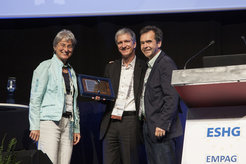Berlin human geneticist has been honored for research on rare diseases
Stefan Mundlos has given this year’s ESHG Award Lecture
Stefan Mundlos, director of the Institute for Medical Genetics and Human Genetics at the Charité – Universitätsmedizin Berlin and head of the research group “Development & Disease” at the Max Planck Institute for Molecular Genetics has been honored with the ESHG Award 2016 for his fundamental work on the identification and characterization of disease genes and disease-causing mechanisms of gene regulation. The award of the European Society of Human Genetics (ESHG) has been given to him during the European Human Genetics Conference 2016 in Barcelona, Spain, on May 24, 2016.

Stefan Mundlos is working on fundamental aspects of genomic diseases. He is particularly interested in malformations and diseases in the context of development, growth, and aging of muscles and bones. In his work, Mundlos combines research on human hereditary diseases with studies on fundamental gene functions in vitro and in cell culture and animal models (in vivo). In recent years, his interest has become more focused on gene regulation and the role of the non-coding regions of the genome. “I think that the interpretation of the non-coding genome, which after all makes up more than 98% of our genome, holds one of the major future challenges in human genetics”, Mundlos explains.
Recently, Mundlos and his team discovered that structural variations (deletions, duplications, inversions) can interfere with the 3D folding of chromatin, thereby influencing gene regulation. “These are very exciting new developments and I am pleased the award helps to focus more attention to a part of the genome that has not been well studied yet,” says Mundlos. “Most studies have focused on finding the genes and finding mutations in genes, but the big question now is “What is the rest doing?”
Background Information
Stefan Mundlos was born in Marburg an der Lahn, Germany, in 1958. He studied Medicine at the Universities of Marburg and Göttingen and got his approval (“Approbation”) as physician in 1985. Following his PhD and a clinical training and Board Certification in Pediatrics, he spent a year as a research fellow in Melbourne, Australia, followed by a postdoc period at the Harvard Medical School in Boston, USA. Back in Germany, he received his habilitation in 1997 and the Board Certification in Human Genetics in 1998. In 2000, he was appointed director of the Institute for Medical Genetics and Human Genetics at the Charité – Universitätsmedizin Berlin and head of the research group “Development & Disease” at the Max Planck Institute for Molecular Genetics in Berlin.
[pm]












